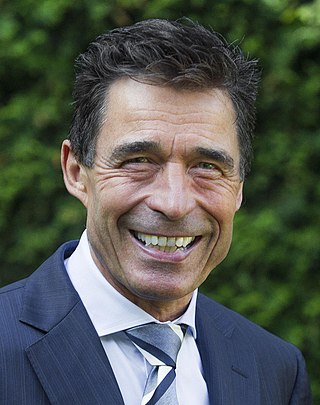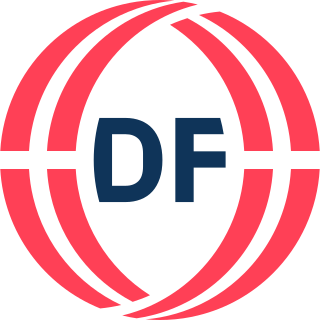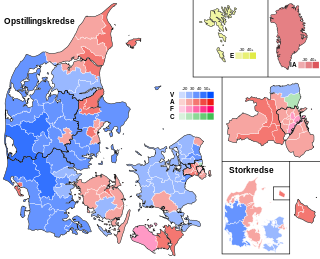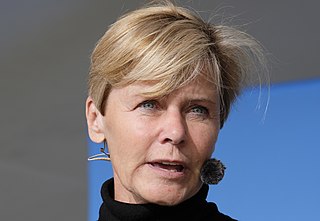
Anders Fogh Rasmussen is a Danish politician who was the 24th Prime Minister of Denmark from November 2001 to April 2009 and the 12th Secretary General of NATO from August 2009 to October 2014. He became CEO of political consultancy Rasmussen Global and founded the Alliance of Democracies Foundation. He serves as a senior adviser to Citigroup. He also served as a senior advisor at The Boston Consulting Group.

Poul Oluf Nyrup Rasmussen is a former Danish politician. He was Prime Minister of Denmark from 25 January 1993 to 27 November 2001 and President of the Party of European Socialists (PES) from 2004 to 2011. He was the leader of the governing Social Democrats from 1992 to 2002 and was also a member of the European Parliament from 2004 to 2009.

Venstre, full name Venstre, Danmarks Liberale Parti, is a conservative-liberal, agrarian political party in Denmark. Founded as part of a peasants' movement against the landed aristocracy, today it espouses an economically liberal, pro-free-market ideology.

The Danish People's Party is a nationalist and right-wing populist political party in Denmark. It was formed in 1995 by former members of the Progress Party (FrP).

General elections were held in Denmark on 8 February 2005. Prime Minister Anders Fogh Rasmussen's Venstre remained the largest party in the Folketing and his governing coalition with the Conservative People's Party remained intact, with the Danish People's Party providing the parliamentary support needed for the minority government. The Danish Social Liberal Party made the biggest gains of any party, although it remained outside the governing group of parties. The elections marked the second time in a row that the Social Democrats were not the largest party in parliament, a change from most of the 20th century. The Social Democrats lost five seats and leader Mogens Lykketoft resigned immediately after the elections. Voter turnout was 85% in Denmark proper, 73% in the Faroe Islands and 59% in Greenland.

Bertel Geismar Haarder is a Danish writer, teacher and politician, who was a member of the Folketing for the Venstre political party. He has served as minister several times, including Minister of Education from 1982 to 1993 and again in 2005 to 2010, and most recently as Minister for Culture and Ecclesiastical Affairs from 2015 to 2016 in the L. L. Rasmussen II Cabinet. He is a former member of European Parliament, serving from 1994 to 2001. He has also served as president of Nordic Council on two occasions, first in 2011 and latest from 2020 to 2021.

Claus Hjort Frederiksen is a Danish politician of the Venstre party, who served as the Danish Minister for Defence from 2016 to 2019, and as Minister for Finance from 2015 to 2016, having previously served in that position from 2009 to 2011, as member of the first Løkke Rasmussen Cabinet. From 2001 to 2009, he was Minister of Employment in the first, second, and third cabinets of Anders Fogh Rasmussen.

Eva Kjer Hansen is a former Danish politician, who was a member of the Folketing for the Venstre political party. She held many ministerial positions, the last being as minister of Fisheries, Gender Equality and Nordic Cooperation from 2 May 2018 to 27 June 2019. Hansen was a member of parliament from the 1990 Danish general election to the 2022 Danish general election where she was not re-elected.

Helle Thorning-Schmidt is a Danish retired politician who served as the 26th Prime Minister of Denmark from 2011 to 2015, and Leader of the Social Democrats from 2005 to 2015. She is the first woman to have held each post. Following defeat in 2015, she announced that she would step down as both Danish Prime Minister and Social Democratic party leader. Ending her political career in April 2016, she was the chief executive of the NGO Save the Children until June 2019.

Kristian Thulesen Dahl is a Danish director and former politician who served as Leader of the Danish People's Party (DPP) from 2012 to 2022. He was a Member of the Folketing (MF) from September 1994 until July 2022, first representing Fremskridtspartiet until 6 October 1995 and then the DPP from that date until 29 June 2022, when he became an independent.
Karen Moustgaard Jespersen is a Danish journalist and former politician representing the party Venstre.
The Liberal Alliance is a classical liberal and right-libertarian political party in Denmark. The party is a component of the centre-right bloc in Danish politics. The party's platform is based upon economic liberalism, promotion of tax cuts and reduction of welfare programmes, and a critical, oppositional stance towards European integration.

General elections were held in Denmark on 13 November 2007. The elections allowed prime minister Anders Fogh Rasmussen to continue for a third term in a coalition government consisting of Venstre and the Conservative People's Party with parliamentary support from the Danish People's Party. They were the first elections held using the current constituencies.
Jakob Axel Nielsen is a Danish lawyer and politician representing the Conservative People's Party. He has been a member of the Folketing from the 2005 to 2010 and was Minister of Traffic and of Energy in the Cabinet of Anders Fogh Rasmussen II from 12 September 2007 to 23 November 2007, and Minister for Health and Prevention from 23 November 2007 to 23 February 2010 in the Cabinet of Anders Fogh Rasmussen III and in the Lars Løkke Rasmussen I Cabinet. Before he was appointed minister, he was his party's spokesman on tax policy.

AFR is a Danish mockumentary released in 2007, directed by Danish filmmaker Morten Hartz Kaplers, who also appears in the film. AFR was produced by the Zentropa-producer Meta Louise Foldager.

General elections were held in Denmark on 15 September 2011 to elect the 179 members of the Folketing. Of those 179, 175 members were elected in Denmark, two in the Faroe Islands and two in Greenland.

The third Cabinet of Danish Prime Minister Anders Fogh Rasmussen was announced on 23 November 2007.

Lars Løkke Rasmussen is a Danish politician who has served as Minister of Foreign Affairs since 2022. He previously served as the 25th Prime Minister of Denmark from 2009 to 2011 and again from 2015 to 2019. He was the leader of the liberal Venstre party from 2009 to 2019.

General elections were held in the Kingdom of Denmark on 5 June 2019 to elect all 179 members of the Folketing; 175 in Denmark proper, two in the Faroe Islands and two in Greenland. The elections took place ten days after the European Parliament elections.

Mette Bock is a Danish political scientist, journalist and former politician. She was a member of the Folketing from 2011 to 2019, representing the Liberal Alliance party. She served as Minister of Culture and Church from 2016 to 2019.

















